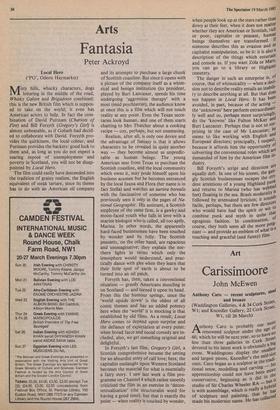Arts
Fantasia
Peter Ackroyd
Local Hero (` PG', Odeon Haymarket)
Misty hills, whacky characters, dogs loitering in the middle of the road, Whisky Galore and Brigadoon combined: this is the new British film which is suppos- ed to take on the world; it even has American actors to help. In fact the com- bination of David Puttnam (Chariots of Fire) and Bill Forsyth (Gregory's Girl) is almost unbeatable, as if Goliath had decid- ed to collaborate with David. Forsyth pro- vides the quirkiness, the local colour, and Puttnam provides the backers: good luck to them and, as long as you do not expect a searing expose of unemployment and poverty in Scotland, you will not be disap- pointed by Local Hero.
The film could easily have descended into the tradition of grainy realism, the English equivalent of steak tartare, since its theme has to do with an American oil company and its attempts to purchase a large chunk of Scottish coastline. But since it opens with a picture of the company itself as a whim- sical and benign institution (its president, played by Burt Lancaster, spends his time undergoing 'aggression therapy' with a most timid psychiatrist), the audience know at once this is a film which will not touch reality at any point. Even the Texan secre- taries look human, and one of them starts chatting to Mrs Thatcher about a cooking recipe — coy, perhaps, but not unamusing.
Realism, after all, is only one device and the advantage of fantasy is that it allows characters to be revealed in quite another way — they become almost as unpredic- table as human beings. The young American sent from Texas to purchase the Scottish coastline, and the local community which owns it, may pride himself upon his business acumen but he becomes entranced by the local fauna and Flora (her name is in fact Stella) and watches an aurora borealis with the fascination of someone who has previously seen it only in the pages of Na- tional Geographic. His assistant, a Scottish employee of the same firm, is a gawky and moon-faced youth who falls in love with a marine biologist who is called, all too aptly, Marina. In other words, the apparently hard-faced businessmen have been touched by wonder and by folly. The Scottish peasants, on the other hand, are rapacious and unimaginative; they explain the nor- thern lights in terms which only the ionosphere would understand, and prac- tically dance with glee when they learn that their little spot of earth is about to be turned into an oil patch.
Forsyth has, then, taken a conventional situation — greedy Americans muscling in on Scotland — and turned it upon its head. From this the humour springs, since the `world upside down' is the oldest of all comic themes and has an added potency here when the 'world' it is mocking is that established by old films. As a result, Local Hero comes to depend upon surprise and the defiance of expectation at every point: when broad farce and social comedy are in- cluded, also, we get something original and delightful.
In Forsyth's last film, Gregory's Girl, a Scottish comprehensive became the setting for an absurdist story of calf love; here, the capitalist onslaught upon Western Scotland becomes the material for what is essentially a fairy story. I saw last week a film pro- gramme on Channel 4 which rather snootily criticised the film as an exercise in `decon- textualisation' (the structuralist word for having a good time), but that is exactly the point — when reality is touched by wonder, when people look up at the stars rather than down at their feet, when it does not matter whether they are American or Scottish, rich or poor, capitalist or peasant, human beings themselves are transformed. It someone describes this as evasion and as capitalist manipulation, so be it: it is also a description of the things which entertain and console us. If you want Zola or Marx, you can go to a library or Highgate cemetery. The danger in such an enterprise is, of course, that of whimsicality — when a deci- sion not to describe reality entails an inabili" ty to describe anything at all. But that does not happen in Local Hero. It has been avoided, in part, because of the acting the 'unknowns' here perform extraordinari" ly well and so, perhaps more surprisinglY; do the `knowns' like Fulton McKay a" Burt Lancaster. Perhaps that is not so silt" prising in the case of Mr Lancaster; be seems to like working with English and European directors; principally, I suspect, because it affords him the opportunity of subverting the conventional roles which are demanded of him by the American film in- dustry. Bill Forsyth's script and direction are equally deft. In one of his scenes, the gall: gly Scottish businessman escapes the stri- dent attentions of a young Highland Punkand returns to Marina (who has webb'd
.
feet) floating in the sea. Brash modernity Is followed by attenuated lyricism; it sounds facile, perhaps, but there are few directors who would have had the spirit or wit to combine punk and myth in quite that egregious fashion. In combination, °' course, they both seem all the more Poig- nant — and provide an emblem of what is 3 touching and graceful (and funny) film'










































 Previous page
Previous page